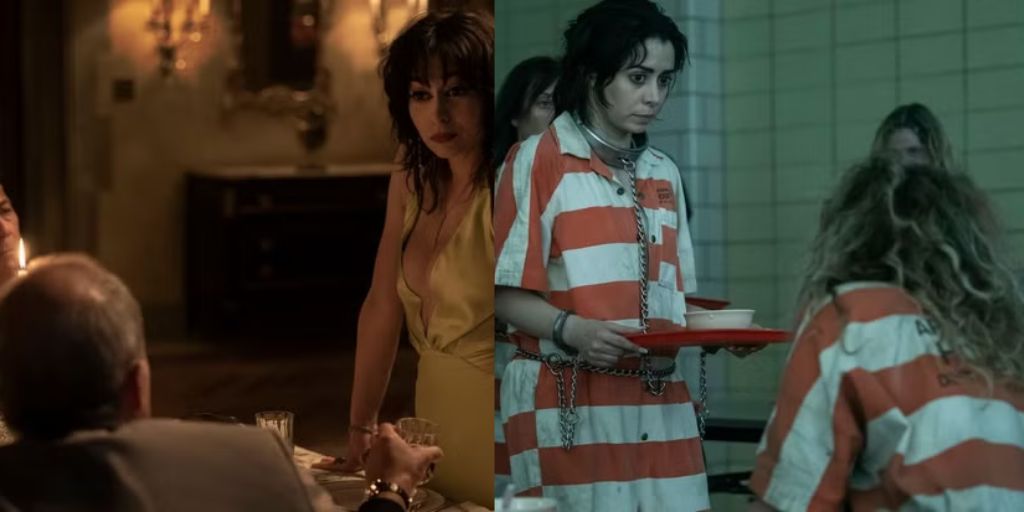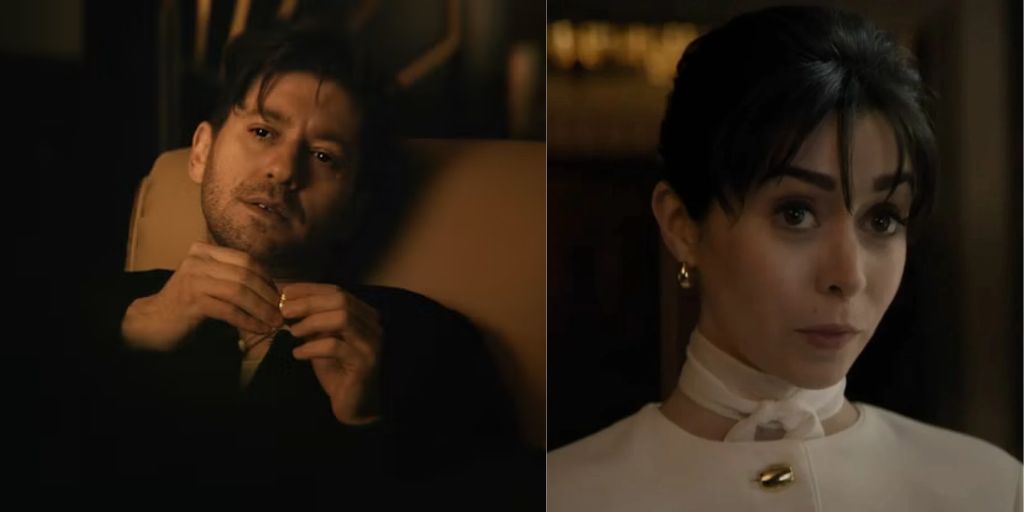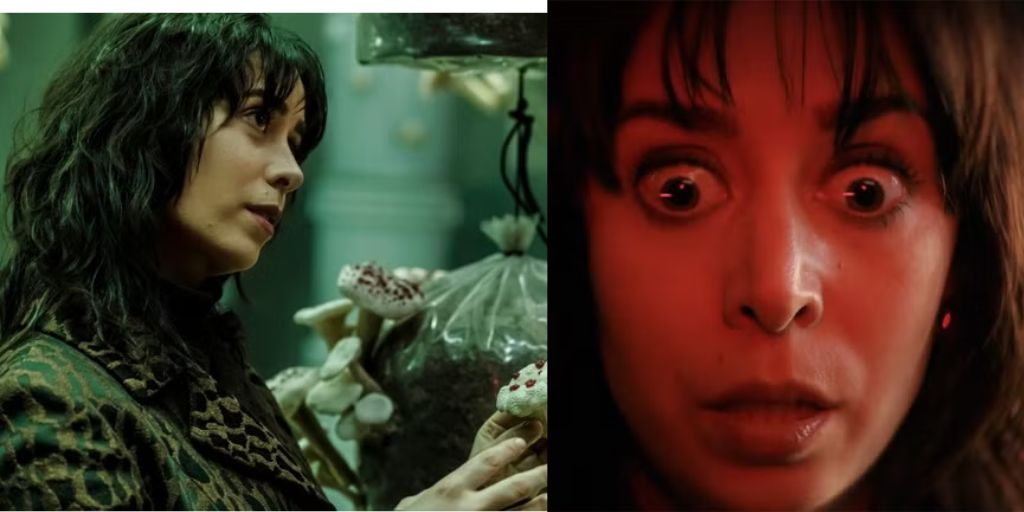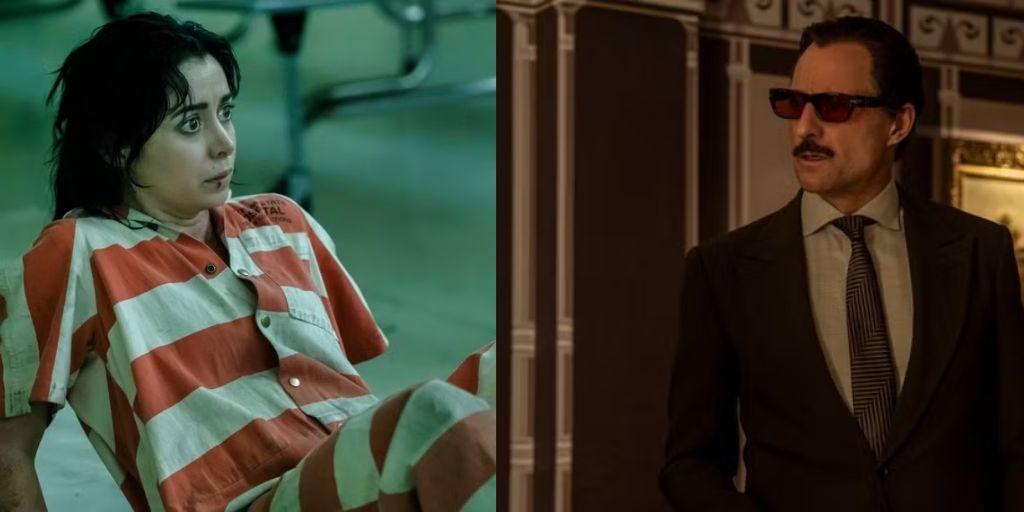Last week’s episode of The Penguin presented an intense storyline where Oz Cobb (Colin Farrell) and Sofia Falcone (Cristin Milioti) joined forces.
They sold a new street drug called Bliss as an act of rebellion against the new heads of the Falcone crime family. This act of defiance was dangerous, and it would set off a chain of events that would change their lives forever.
Oz and Sofia partnered with the Triad crime syndicate. They blackmailed Falcone’s underboss, Johnny Viti (Michael Kelly), to support their plan.
However, their rivals were quick to catch up with them. The episode ended on a cliffhanger, with Oz and Sofia held at gunpoint by Nadia Maroni (Shohreh Aghadashloo) and her men. Fortunately, Victor Aguilar (Rhenzy Feliz) created a distraction. This distraction allowed Oz to escape, but he had to leave Sofia behind.
One of the biggest surprises in this episode was the revelation that Oz had betrayed Sofia. He snitched on her to her father, Carmine Falcone (Mark Strong), leading to her imprisonment in Arkham Asylum. The next episode, titled “Cent’anni,” goes deeper into Sofia’s tragic backstory and shows whether she truly deserves the nickname “The Hangman.”
A New Carmine Falcone Makes an Entrance
The episode begins by recapping the last moments of the previous episode, but this time it is told from the perspectives of Oz and Sofia. Nadia threatens them, saying she knows all about Bliss and that the Maronis will take over the operation.
Sofia has no idea that Oz is working with the Maronis. She barely has time to think before Victor crashes his car into the scene, which leads to a shootout before he and Oz flee.
After the chaos, Sofia quickly calls her psychiatrist, Dr. Julian Rush (Theo Rossi), but she falls unconscious before the call ends.
The episode then flashes back ten years. In this flashback, Sofia speaks at a charity gala about her mother’s mental illness and suicide. Oz, her driver, watches her with pride.
After her speech, Oz escorts her out, and they share a cigarette. Their relationship seems much more relaxed than in previous episodes. Sofia does not appear to be the unhinged person we have seen before. Their conversations feel genuine, based on mutual respect and admiration.
When Oz steps away to get the car, Sofia is approached by reporter Summer Gleeson (Nadine Malouf). Summer informs her about a series of women who died by suicide, all by hanging.
One of the women, Yolanda Jones, worked at the Iceberg Lounge, and many of the others were found dead near businesses owned by Carmine Falcone. Sofia is upset by this information and orders Oz to drive away, showing her disgust and disbelief.
Later, while looking at a family portrait at the Falcone estate, Sofia remembers finding her mother’s body as a child. This memory is interrupted when her father calls her to dinner with him and her brother Alberto (Michael Zegen). During dinner, Carmine criticizes Alberto for not investigating Congressman Hill’s finances but praises Sofia for being more reliable.

Suddenly, Alberto receives a text and leaves abruptly. Carmine tells Sofia that he wants her to lead the family when the time comes. Sofia questions him about her mother, claiming she does not remember her being ill. Carmine insists that her mother was good at hiding her illness and that he did everything he could to help her.
Fans of The Penguin have known for a while that Mark Strong would be taking over the role of Carmine Falcone from John Turturro, who played him in The Batman. This episode marks the first time Strong portrays the character.
His acting style differs significantly from Turturro’s, but Strong makes the character his own, and the flashback setting allows him to be effective. While some might prefer Turturro’s return, Strong manages to stay true to the character’s essence.
Later, Oz drives Alberto and Sofia to the Iceberg Lounge. Sofia asks Alberto if their father had any relationships with the women working at the club’s underground venue, 44 Below.
Alberto becomes suspicious, but Sofia insists he sees a side of their father that she never has. Alberto denies knowing anything, while Oz eavesdrops from the driver’s seat.
That night, Sofia meets Summer again, who shows her autopsy photos of the dead women. All the women have bruises around their necks, which are more complex than simple rope marks.
Sofia, in denial about her father’s involvement, accuses Summer of creating conspiracy theories to advance her career at the Gotham Gazette. She orders Oz to drive away, rejecting the truth that Summer presents.
Sofia Becomes “The Hangman”
At Carmine’s birthday party, Oz approaches Sofia. He tells her that her father wants to see her in his office. Carmine reprimands her for speaking with the press. Knowing Oz has informed her father about her meeting with Summer Gleeson, Sofia tries to defend herself. She denies having talked to the reporter since the charity event.
Carmine accuses her of doubting him and reveals that Summer is working with the Gotham City Police Department on an investigation into his possible involvement in the murders. He claims she is sick and tells Oz to take her home.
Oz tries to apologize to Sofia while they drive. He claims he was only looking out for her. A heartbroken Sofia tells him he broke her trust just to gain her father’s attention and move up in the family. Suddenly, GCPD cars surround their vehicle. Sofia is arrested.
It is revealed that Summer Gleeson has been murdered, and Sofia is charged with her death and the deaths of other women found hanged. Later, Sofia meets with her lawyer and Alberto, who show her newspapers that have labeled her “The Hangman.”
They explain that Carmine has framed her, saying she has a history of mental illness. Other family members, including Luca (Scott Cohen) and the Vitis, wrote letters to the judge supporting this claim. Sofia will undergo a psychological evaluation, which she believes will prove her sanity.
However, her lawyer informs her that the court has ordered her to Arkham State Hospital for six months leading up to her trial. After the lawyer leaves, Sofia breaks down before being taken away by police.
At Arkham, Sofia is under the supervision of Dr. Ventris (T. Ryder Smith), Arkham’s chief psychiatrist, and his associate, Julian Rush, who will conduct her evaluation. She is placed under mandatory isolation, which prevents her from having visitors or contact with the outside world.
Sofia pleads her case to both doctors, insisting she is innocent, but they ignore her. After she is locked in her cell, another inmate named Magpie (Marié Botha) talks to her through the vent, asking if she is really “The Hangman.”

In the mess hall, Magpie receives a red-colored drug known as Bliss. This drug lulls her into a euphoric state while Sofia looks on. Soon, another patient named Abby (Syd Skidmore), who is unchained, approaches Sofia, accusing her of murder and begins to attack her.
Sofia Embraces Her Dark Side
Hours later, Sofia wakes up in her cell, battered and bruised from the attack. Julian is standing over her. He reminds her that she previously went to therapy after her mother’s death, stating that grief can lead to anger. Sofia tells Julian that her father is framing her, but he does not believe her.
She is led back to the mess hall, where Abby is brought out in chains. Abby mocks Sofia by repeatedly calling her a killer. Sofia is handed a fork and released from her restraints, realizing she is being tested by Dr. Ventris.
As she approaches Abby, she is knocked down, and Abby takes the fork, pleading with Sofia to “end it.” Sofia watches in shock as Abby stabs herself in the neck multiple times before guards drag her away for electric shock therapy.
Sofia starts to lose her grip on reality. The doctors at Arkham continue to abuse her, despite her pleas of innocence. Julian questions Dr. Ventris, realizing Sofia may be telling the truth, but his theory is quickly dismissed. Six months later, Sofia receives a visit from a sad Alberto.
He tells her that Dr. Ventris has deemed her mentally unfit for trial. Alberto promises to fight for her, but Sofia ignores Julian’s apology, claiming he should have prevented Ventris from writing the report.
Back in the mess hall, Magpie gleefully tells Sofia that she no longer needs to lie to get drugs from Dr. Ventris. Emotionally numb, Sofia asks if Magpie is spying on her, but Magpie ignores the question and continues rambling.
Finally, Sofia snaps and attacks her, bashing her head into a table. Realizing that Ventris is watching, Sofia pleads her innocence again but is given a sedative instead.
In the present day, Sofia wakes up in Julian’s office. She receives food and a change of clothes. Sofia confides in Julian, saying she feels foolish for trusting Oz.
She admits she should have killed him when she had the chance. Julian encourages Sofia to flee to Italy, which Luca initially advised her to do. Sofia begins to intimidate Julian, asking why she should trust him after being lied to and manipulated for the past ten years in Arkham.
Sofia leaves, telling Julian he is right, and she needs a fresh start. She returns to the Falcone estate, dressed elegantly. As Luca leads a family dinner, everyone falls silent when she walks in. Sofia calmly pours a drink for herself, signaling her dominance over the room.
As she sits down at the head of the table, the family exchanges wary glances. They can see she has changed, hardened by her experiences in Arkham.
Carmine looks particularly troubled; he realizes that the daughter he framed is no longer the vulnerable girl he could manipulate. Sofia makes it clear she has returned not just to reclaim her place in the family but also to confront those who have wronged her.
“I know what you all said about me while I was gone,” Sofia begins, her voice steady but laced with bitterness. “You thought you could bury me, but instead, you buried your own secrets.”
Alberto attempts to defuse the tension, but his words fall flat. Carmine raises his glass, attempting to regain control of the room. “We’re family, Sofia. We need to stand together.”
“Family?” Sofia scoffs. “Is that what you call it when you lie to me, betray me, and leave me to rot in Arkham? I’m done being your pawn.”
The Rise of “The Hangman”
Sofia’s transformation into “The Hangman” begins here. She takes control of her narrative, seeking revenge on those who conspired against her. In a series of chilling scenes, Sofia initiates her plan.

Her first target is Johnny Viti, the underboss who stood by as her father framed her. She arranges a meeting under the guise of wanting to reconnect with the family business. When they meet at a secluded bar, Sofia turns on the charm. She plays the part of the obedient daughter who has returned to her roots.
“You and I, Johnny, we have a lot in common,” she says, leaning in close. “We’ve both suffered at the hands of the old man.”
Johnny, unaware of her true intentions, smirks and brags about how he has gained favor with Carmine. But Sofia interrupts him, saying, “You’re nothing but a pawn in a game you don’t even understand.”
Before Johnny can respond, Sofia reveals her blade. The meeting turns deadly as she executes her plan, leaving Johnny’s lifeless body in the bar’s backroom. This is her first act of vengeance, and she savors the power that comes with it.
Back at the Falcone estate, she tells Alberto what she has done. Instead of being horrified, he is intrigued. “I knew you had it in you,” he admits, a twisted pride in his voice. “Maybe we should take this further. We could reclaim our father’s empire together.”
Assembling a New Order
With her sights set on vengeance, Sofia begins to assemble a new team to help her in her quest for power. She reconnects with Victor, who has been working independently but is eager to team up with her again. They share a mutual understanding; both have experienced betrayal, and both are ready to turn the tables.
“Together, we can take back what’s ours,” Sofia says, confidence radiating from her. “We can make the Maronis pay for everything they’ve done.”
Victor agrees, and they start to form alliances with other crime families in Gotham. Sofia makes strategic moves to undermine the Maronis, gathering intel on their operations while quietly working to dismantle their influence. Each successful maneuver emboldens her and allows her to further establish her reputation as “The Hangman.”
As news spreads of Johnny Viti’s disappearance, fear begins to grip the criminal underworld. Rumors swirl about a new power rising in Gotham, a force that won’t hesitate to eliminate anyone standing in her way. Sofia’s reputation begins to grow, as does her resolve. She’s no longer just Carmine Falcone’s daughter; she is a force to be reckoned with.
The Final Confrontation
Sofia knows that to truly solidify her power, she must confront her father. In a dramatic showdown at the Falcone estate, she faces Carmine, the man who betrayed her most.
“You thought you could keep me down, didn’t you?” she taunts, her eyes blazing with fury. “You thought you could silence me forever.”
Carmine tries to maintain his facade of authority, but he can see the change in Sofia. “You’re not ready for this, Sofia. You don’t understand the world you’re stepping into.”
“Maybe I understand it better than you ever did,” she replies, the conviction in her voice sending a shiver down Carmine’s spine.
As they engage in a fierce verbal battle, Sofia reveals the truth about her mother’s death and how Carmine’s actions contributed to it. “You let her suffer, and then you discarded her like trash,” she accuses. “You did the same to me. But I’m not broken. I’m ready to take my place at the table.”
Carmine scoffs, but the fear in his eyes is unmistakable. “You think you can control the empire? You’ll never be able to run it like I did. You’re too emotional.”
Sofia leans closer, her voice dripping with disdain. “And that’s why I’ll succeed. I’m not afraid to get my hands dirty.”
In a shocking twist, Sofia reveals the alliance she has formed with the Triads and how they have pledged their support to her cause. “You’re going to find that I have more allies than you ever imagined,” she declares, her voice filled with triumph.
A New Era
With the tension escalating, Sofia confronts the reality of her actions. She has chosen a path filled with violence and revenge, but she believes it is the only way to reclaim her power. The episode ends on a cliffhanger, leaving viewers wondering how far Sofia is willing to go to solidify her new identity as “The Hangman.”
The narrative of Sofia Falcone reflects a journey of transformation and vengeance. From a vulnerable daughter framed by her father to a powerful woman commanding respect in Gotham’s criminal underworld, Sofia’s character arc showcases resilience and the lengths one will go to reclaim lost power.
Conclusion
The journey of Sofia Falcone in The Penguin serves as a powerful narrative about the complex nature of identity, loyalty, and the quest for power in a morally ambiguous world.
Her transformation from a victim of her father’s machinations into a formidable force in Gotham’s criminal underworld is a compelling exploration of how trauma can shape a person’s destiny. Sofia embodies resilience in the face of overwhelming adversity, showcasing that strength often arises from vulnerability.
At the heart of Sofia’s story lies a profound theme of betrayal. Her father, Carmine Falcone, a figure she once revered, betrays her trust most devastatingly. By framing her for crimes she did not commit and casting her into Arkham Asylum, he not only attempts to silence her but also reveals the depths of his manipulative nature.

This betrayal acts as a catalyst for Sofia’s transformation. It ignites a fire within her that propels her to seek revenge not just against her father but against the entire system that has oppressed her. This scheme of betrayal resonates with anyone who has ever felt wronged or abandoned, making her story both relatable and poignant.
Furthermore, Sofia’s rise as “The Hangman” raises questions about morality and the nature of justice. In her quest for power, she blurs the lines between right and wrong, challenging the audience to reconsider their notions of justice. Is her desire for vengeance justified? Does the end truly justify the means?
As she aligns herself with the Triad and engages in ruthless tactics, viewers are left grappling with the moral implications of her actions. This complexity adds layers to her character, making her not just a villain or a hero but a deeply flawed individual who embodies the struggles of many.
The relationship dynamics within the Falcone family further highlight the themes of loyalty and power. As Sofia confronts Carmine, the tension between father and daughter reveals the intricate balance of power in their family.
Carmine, who once saw Sofia as a pawn in his game, now finds himself threatened by her emerging strength. This shift in power dynamics illustrates a fundamental truth about family—loyalty can be both a strength and a weakness.
While Carmine attempts to control Sofia through fear and manipulation, she ultimately reclaims her agency, defying his expectations and forging her path.
Sofia’s character arc also reflects broader themes of empowerment and female agency in a traditionally male-dominated world. Her journey from victimhood to empowerment is a powerful commentary on the struggles many women face.
By embracing her dark side, she takes control of her narrative and defies the societal norms that seek to confine her.
This aspect of her character is particularly resonant in contemporary discussions around gender, power, and autonomy. Sofia stands as a symbol of defiance against patriarchal structures, making her story not just one of crime and vengeance but also one of empowerment.
As viewers look forward to the remaining episodes of The Penguin, they are left to ponder the future of Sofia Falcone and the implications of her choices.
Will her thirst for power lead to her downfall, or will she successfully show the treacherous waters of Gotham’s criminal underbelly? The suspense surrounding her character keeps audiences engaged, eager to witness the unfolding drama.
The Penguin expertly weaves a narrative rich with themes of betrayal, power, and transformation through the lens of Sofia Falcone’s journey. Her evolution into “The Hangman” serves as a compelling reminder that in the fight for power, one must be willing to confront their demons and challenge the very foundations of their identity.
Sofia’s story resonates deeply, highlighting the complexities of human nature and the lengths one will go to reclaim their agency in a world that often seeks to oppress them.
As the series progresses, viewers are left not only rooting for Sofia’s success but also reflecting on the intricate dynamics of loyalty, betrayal, and the moral ambiguity of power in a world where the lines between good and evil are perpetually blurred.





